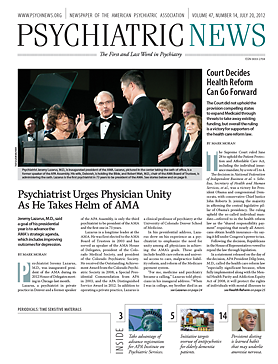Researchers at Yale University have published a study designed to tease out the effects of a serotonin reuptake inhibitor (SRI) on a developing baby from that of the depressive condition for which a mother was prescribed the medication.
Kimberly Yonkers, M.D., a professor of psychiatry, and of obstetrics, gynecology, and reproductive sciences at Yale School of Public Health, and her colleagues have found that the use of an SRI, both with and without a major depressive episode, was associated with preterm birth, leading them to conclude that women who are depressed during pregnancy are not at higher risk of giving birth prematurely than nondepressed women—but those who take antidepressants during pregnancy seem to be.
Yonkers and her colleagues, whose study is published in the July Epidemiology, began with the hypothesis that SRIs and major depressive episodes in pregnancy independently increase the risk for both preterm and early preterm birth. Their findings came from a prospective cohort study of 2,793 pregnant women who had experienced a recent episode of major depression or used an SRI. They extracted data on birth outcomes from hospital charts, differentiating between early preterm birth—less than 34 weeks’ gestation—and preterm birth, less than 37 weeks. Pregnant women were enrolled at 137 obstetrical practices and hospital-based clinics affiliated with Yale University School of Medicine throughout Connecticut and western Massachusetts from March 2005 to May 2009, and followed until September 2009.
The SRIs used by study participants included citalopram, fluoxetine, escitalopram, paroxetine, sertraline, duloxetine, and venlafaxine.
They found that a major depressive episode without SRI use had no clear effect on preterm-birth risk.
“Women did not ask to be depressed, and yet they worry that their depression may affect their baby,” said Yonkers in a press release discussing the research. “This study tells them they should not worry that they are somehow compromising their pregnancy because they are depressed. And when considering whether to take medication for depression, women should understand that the risk of preterm birth is only one of many factors they should weigh.”
The researchers did not have a clear explanation for why neither SRI use nor depression was associated with “early” preterm birth, but theorized that SRIs might be more likely associated with spontaneous forms of preterm birth, as compared with early preterm births, which are usually medically indicated and therefore often induced.
Yonkers has collaborated in the past on studies of the management of bipolar disorder during pregnancy and the postpartum period with Katherine Wisner, M.D., a professor of psychiatry, obstetrics, gynecology, and reproductive sciences and epidemiology at the University of Pittsburgh School of Medicine. In an editorial in the June American Journal of Psychiatry, Wisner explained the necessity of conducting research that addresses risks of treatment for psychiatric conditions to the woman, her fetus, and her family: “The clinical challenge is to judge whether the disease burden is reduced sufficiently by pharmacotherapy to offset the risk of drug exposure and support a more favorable reproductive outcome.”
Yonkers and her colleagues said their study adds to a growing body of research suggesting that use of SRIs during pregnancy may increase a woman’s risk of early delivery: “In assessing the implications of this risk for clinical practice, care must be taken to balance the health implications for the mother with those for the fetus.”
The study was supported by a grant from the National Institute of Child Health and Human Development of the National Institutes of Health.


